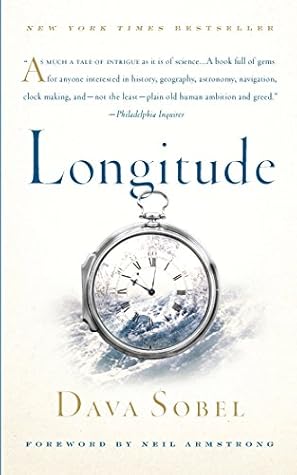More on this book
Community
Kindle Notes & Highlights
by
Dava Sobel
Read between
April 20 - April 22, 2020
Every day at sea, when the navigator resets his ship’s clock to local noon when the sun reaches its highest point in the sky, and then consults the home-port clock, every hour’s discrepancy between them translates into another fifteen degrees of longitude.
One degree of longitude equals four minutes of time the world over, but in terms of distance, one degree shrinks from sixty-eight miles at the Equator to virtually nothing at the poles.
In the course of their struggle to find longitude, scientists struck upon other discoveries that changed their view of the universe. These include the first accurate determinations of the weight of the Earth, the distance to the stars, and the speed of light.
King Louis XIV of France, confronted with a revised map of his domain based on accurate longitude measurements, reportedly complained that he was losing more territory to his astronomers than to his enemies.
timepieces don’t really keep time. They just keep up with it, if they’re able.
because of the Earth’s rotation, a star should transit exactly 3 minutes, 56 seconds (of solar time) earlier than the previous night. Any clock that can track this sidereal schedule proves itself as perfect as God’s magnificent clockwork.
since the moon’s orbital motion varies cyclically over an eighteen-year period, eighteen years’ worth of data constitute the bare minimum groundwork for any meaningful predictions of the moon’s position.
scientists assert that the moon is not speeding up; rather, the Earth’s rotation is slowing down, braked by tidal friction,
tiny deviations in the tilt of the Earth’s axis, which he correctly blamed on the pull of the moon.
the great circumnavigator kicked scurvy overboard. Not only is sauerkraut’s chief ingredient, cabbage, loaded with vitamin C but the fine-cut cabbage must be salted and allowed to ferment until sour to be worthy of the name.
sauerkraut went on saving sailors’ lives until lemon juice and, later, limes replaced it in the provisions of the Royal Navy.
Harrison’s work facilitated England’s mastery over the oceans, and thereby led to the creation of the British Empire—for it was by dint of the chronometer that Britannia ruled the waves.


